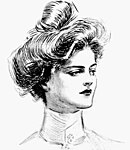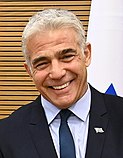From today's featured article
In 1948, Harry S. Truman contested the presidency of the United States. Truman (pictured), a Democrat, ascended to the presidency upon the death of Franklin D. Roosevelt. His pro–civil rights views were opposed by most of the Southern Democrats; when the Democratic National Convention adopted his civil rights plank, a large group of Southerners walked out. Truman selected Alben W. Barkley as his running mate. Campaigning against Thomas E. Dewey, the Republican candidate, Truman called the Republican-controlled 80th Congress a "do-nothing Congress". He conducted a whistle-stop tour giving speeches in different states. With the split of the Democratic Party, most of the polls predicted Truman to lose the election. On the election day, before the declaration of final results, an early edition of the Chicago Daily Tribune printed the headline "Dewey Defeats Truman", boldly anticipating Dewey's victory. Truman won the election in one of the greatest upset victories, receiving 303 electoral votes. (Full article...)
Did you know ...

- ... that Margaret Abbott (pictured) was the first American woman to win an Olympic event, but never realized it?
- ... that Owen Jones's elaborately ornamented Book of Common Prayer "pointed to the direction that books in general were to follow in the Victorian Age"?
- ... that George Mann Niedecken was a Prairie-style interior architect who designed furniture for Frank Lloyd Wright and worked for Marion Mahony Griffin?
- ... that in the 1917 municipal election in Minsk, Belorussian parties only won 2 out of 102 seats?
- ... that as a lawyer, Peter Dowding defended more than 100 Vietnam War conscientious objectors?
- ... that Rafflesia lawangensis was previously misidentified as Rafflesia arnoldii, only to be identified as a new species in 2005 after photographs of it were sent to the National University of Malaysia?
- ... that Paul Chadick performed so well in the Delaware River Basketball League that a sportswriter said it would "benefit the league if he retired"?
- ... that the ancient Romans made toothpaste with human urine?
In the news
- Yair Lapid (pictured) succeeds Naftali Bennett as Prime Minister of Israel.
- Fifty-three migrants are found dead in a tractor-trailer in San Antonio, Texas, United States.
- In ice hockey, the Colorado Avalanche defeat the Tampa Bay Lightning to win the Stanley Cup.
- At least twenty-one people are found dead in a nightclub in East London, South Africa.
On this day
July 4: Feast day of Saint Ulrich of Augsburg (Catholicism); Republic Day in the Philippines (1946)
- 414 – Byzantine emperor Theodosius II proclaimed his older sister Aelia Pulcheria as Augusta.
- 1054 – Chinese astronomers recorded the sudden appearance of a "guest star", later identified as the supernova that created the Crab Nebula.
- 1862 – In a boat on the River Thames from Oxford to Godstow, author Lewis Carroll told Alice Liddell (pictured) and her sisters a story that later formed the basis for his book Alice's Adventures in Wonderland.
- 1918 – World War I: Allied forces led by the Australian general John Monash won the Battle of Hamel, demonstrating the effectiveness of combined-arms techniques in trench warfare.
- 1982 – Four Iranian diplomats were kidnapped after they were stopped at a checkpoint in northern Lebanon by Lebanese Phalange forces; their fates remain unknown.
- Usama ibn Munqidh (b. 1095)
- Poundmaker (d. 1886)
- Andre Spitzer (b. 1945)
From today's featured list
Between 1873 and 1932, the American composer John Philip Sousa composed 136 American military marches, for which he is best known. Sousa derived few of his marches from his other musical compositions such as melodies and operettas. "The Stars and Stripes Forever" (audio featured) is considered to be Sousa's most famous composition. A British journalist named Sousa "The March King", in comparison to "The Waltz King", a nickname of Johann Strauss II. However, not all of Sousa's marches have had the same level of public appeal. Some of his early marches are less well-known and rarely performed. Sousa served as leader of the United States Marine Band from 1880 to 1892, and performed at the inaugural balls of Presidents James A. Garfield and Benjamin Harrison. In 1987, "The Stars and Stripes Forever" was made the national march of the United States, by an act of Congress. The "U.S. Field Artillery March" is the official march of the United States Army. After leaving the Marine Band, he formed a civilian band and composed various marches in the subsequent 39 years. (Full list...)
Today's featured picture

|
|
The Ellis Island Immigrant Hospital (also known as USPHS Hospital #43) was a United States Public Health Service hospital on Ellis Island in New York Harbor that operated from 1902 to 1951. It is part of the Statue of Liberty National Monument. The hospital had two functions: treating immigrants who were ill upon arrival, and treating immigrants with conditions that were prohibited by immigration laws. These latter patients were stabilized and often sent back to their home countries. More than 275,000 patients were treated at Ellis Island; there were approximately 4,000 fatalities and 350 babies were born there. Efforts to restore the hospital buildings and other structures on the island are being made by the non-profit organization Save Ellis Island. This photograph depicts a window in the Ellis Island Immigrant Hospital, decorated in 2014 by the French artist JR with reproductions of photographs of immigrants at the hospital. Artwork credit: JR; photographed by Rhododendrites
Recently featured:
|
Other areas of Wikipedia
- Community portal – The central hub for editors, with resources, links, tasks, and announcements.
- Village pump – Forum for discussions about Wikipedia itself, including policies and technical issues.
- Site news – Sources of news about Wikipedia and the broader Wikimedia movement.
- Teahouse – Ask basic questions about using or editing Wikipedia.
- Help desk – Ask questions about using or editing Wikipedia.
- Reference desk – Ask research questions about encyclopedic topics.
- Content portals – A unique way to navigate the encyclopedia.
Wikipedia's sister projects
Wikipedia is written by volunteer editors and hosted by the Wikimedia Foundation, a non-profit organization that also hosts a range of other volunteer projects:
-
Commons
Free media repository -
MediaWiki
Wiki software development -
Meta-Wiki
Wikimedia project coordination -
Wikibooks
Free textbooks and manuals -
Wikidata
Free knowledge base -
Wikinews
Free-content news -
Wikiquote
Collection of quotations -
Wikisource
Free-content library -
Wikispecies
Directory of species -
Wikiversity
Free learning tools -
Wikivoyage
Free travel guide -
Wiktionary
Dictionary and thesaurus
Wikipedia languages
This Wikipedia is written in English. Many other Wikipedias are available; some of the largest are listed below.
-
1,000,000+ articles
-
250,000+ articles
-
50,000+ articles


